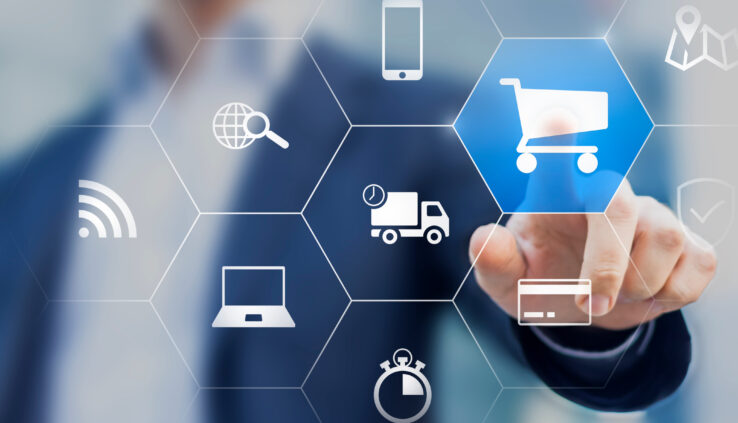E-commerce has been experiencing unprecedented growth, driven by advancements in technology and shifting consumer behaviours. As businesses strive to stay competitive, understanding the potential of emerging technologies and data-driven strategies is essential. In this article, we look at future of e-commerce, exploring how innovations such as Artificial Intelligence, Augmented Reality, Blockchain, and Big Data analytics are shaping the industry.
- Artificial Intelligence and Machine Learning
Artificial Intelligence (AI) and Machine Learning (ML) are revolutionizing the e-commerce experience, enabling businesses to deliver personalized interactions and streamline operations. Here’s a closer look at their transformative capabilities:
- Personalization: AI algorithms analyze vast amounts of customer data, including browsing history, purchase behaviour, and demographic information, to provide personalized product recommendations. By understanding individual preferences, businesses can enhance the shopping experience and increase conversion rates.
- Chatbots: ML-powered chatbots offer round-the-clock customer support, addressing inquiries, resolving issues, and even assisting with product selection and checkout processes. These intelligent virtual assistants improve customer satisfaction while reducing the burden on human customer service agents.
- Predictive Analytics: By leveraging AI and ML algorithms, businesses can harness predictive analytics to anticipate future trends and consumer behaviour. From forecasting demand to optimizing pricing strategies, predictive analytics empower businesses to make data-driven decisions and stay ahead of the competition.
- Augmented Reality (AR) and Virtual Reality (VR)
Augmented Reality and Virtual Reality technologies are blurring the lines between online and offline shopping experiences, offering immersive and interactive ways for consumers to engage with products:
- Virtual Try-On: AR applications enable customers to virtually try on clothing, accessories, and cosmetics, providing a realistic preview of how products will look before making a purchase. By reducing uncertainty and increasing confidence, virtual try-on experiences can significantly reduce return rates and enhance customer satisfaction.
- Virtual Showrooms: VR allows businesses to create virtual showrooms and interactive experiences where customers can explore products in a simulated environment. Whether showcasing furniture arrangements or demonstrating complex features, virtual showrooms captivate customers’ attention and drive engagement.
- Interactive Product Visualization: AR and VR technologies enable interactive product visualization, allowing customers to manipulate and interact with products in real-time. Whether rotating 3D models or overlaying virtual objects in the physical world, interactive visualization enhances product understanding and empowers customers to make informed purchasing decisions.
- Blockchain Technology
Blockchain technology holds immense promise for e-commerce, offering unparalleled security, transparency, and efficiency across various aspects of the industry:
- Fraud Prevention: Blockchain’s decentralized ledger ensures the integrity of transactions, making it virtually impossible for fraudulent activities such as chargebacks or identity theft to occur. By enhancing trust and security, blockchain technology instills confidence in both businesses and consumers.
- Supply Chain Management: Blockchain enables end-to-end transparency and traceability in supply chains, allowing businesses to track the movement of goods from manufacturer to end consumer. By providing immutable records of transactions and provenance, blockchain enhances accountability and mitigates the risk of counterfeit products.
- Cryptocurrency Payments: Blockchain facilitates secure and decentralized cryptocurrency payments, offering an alternative to traditional payment methods. With lower transaction fees, faster processing times, and reduced reliance on intermediaries, cryptocurrency payments can streamline cross-border transactions and expand access to global markets.
- Big Data Analytics
Big Data analytics empower e-commerce businesses to unlock valuable insights from vast volumes of data, driving informed decision-making and strategic growth:
- Customer Segmentation: By segmenting customers based on demographics, behaviour, and preferences, businesses can tailor marketing campaigns and promotions to specific target audiences. By delivering personalized messages and offers, businesses can increase customer engagement and loyalty.
- Predictive Modeling: Big Data analytics enable predictive modelling, forecasting future trends, demand patterns, and consumer behaviour. By anticipating market shifts and demand fluctuations, businesses can optimize inventory management, pricing strategies, and product development efforts.
- Behavioural Analysis: By analyzing customer behaviour data, businesses can gain deeper insights into consumer preferences, browsing habits, and purchase patterns. By understanding the customer journey and identifying pain points, businesses can optimize website design, navigation, and conversion funnels to enhance the overall shopping experience.
The future of e-commerce is shaped by emerging technologies and data-driven innovations that empower businesses to deliver personalized, immersive, and secure shopping experiences. By embracing AI, AR, VR, blockchain, and Big Data analytics, businesses can differentiate themselves in a competitive market, drive customer engagement, and fuel sustainable growth.
Ready to unlock the full potential of emerging technologies and data-driven strategies for your e-commerce business? Connect with geekspeak Commerce today to explore how our expertise can help you thrive.
